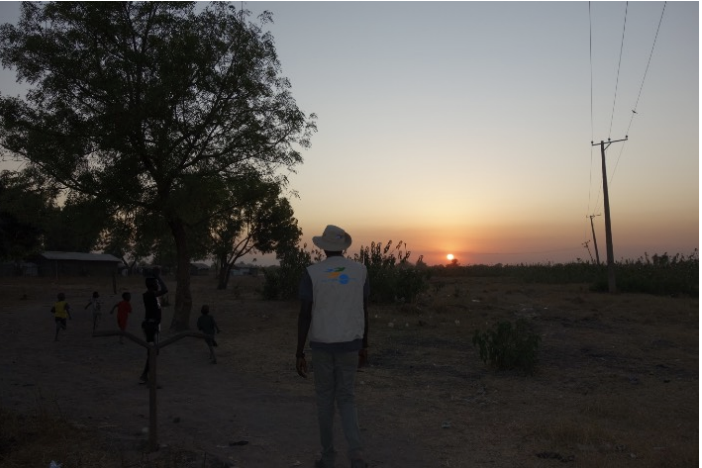A Survivor's Story of Threat and Resilience
Addressing Gender-Based Violence (GBV) Through Effective Humanitarian Coordination
A 28-year-old mother of three who has lived with her husband’s family in the UN Protection of Civilians Site in Bentiu (POC) had been physically assaulted and continuously threatened by her husband.
On 6 December 2019, Nonviolent Peaceforce’s (NP) Beyond Bentiu Response Team in Rubkona County was requested by the Protection Cluster to respond to a case of gender-based violence and provide support to a female survivor whose life was at risk.
While the husband had been absent for three years, his wife and children were living in the POC, primarily supported by his cousin. Upon return to the POC after years of absence, the husband accused his wife of infidelity and threatened to take her life.
Gaps in Protection
The death threats from the husband forced the wife to move out of her husband’s family house to ensure the safety of herself and her children.
The husband searched for her in the POC but was not able to locate his wife nor the children until he learned about her visiting a hospital with their youngest child. The husband arrived at the hospital, gained access to inside the medical facility, and physically assaulted his wife and an international medical staff present at the scene.
With the help of guards at the hospital, the medical team was able to remove the man from the facility and called UNPOL. Although UNPOL arrived at the scene and arrested the man, he was released the following day due to his disability.
As soon as released from detention, the man returned to the hospital and continued threatening the medical staff and his wife.
The response to this incident proved to be ineffective and demonstrated a need to further examine how offenders with disabilities should be dealt with in the POC. NP raised this concern with the Protection Cluster and will continue to follow up on it further providing support as appropriate.
Coordinated Response: Partnering for Safety
After the incident, the survivor said that she wanted to leave the POC due to the risk to her and her children, and return to her brother’s house in Southern Unity, a 3.5 hour drive from the POC.
NP’s role was to ensure protection and safety of the survivor and her children. Therefore, from 6 to 11 December 2019, NP team coordinated with partners in the Protection Cluster and health providers to develop a plan to transfer the woman and her children to safety.
Moving of the family from the POC undetected by the husband, who was by then spending every day outside the hospital waiting for her to be discharged, proved to be challenging and required effective coordination and cooperation among all partners involved.
The health partner agreed to keep the woman in the hospital for safety while the plan on how to transfer the family to safety was developed. NP met with the woman several times to update her and seek her approval for the plan in development while meeting with the Relief, Reintegration, and Protection Section of United Nations Mission in South Sudan (RRP), the United Nations Department for Safety and Security (UNDSS) and the United Nations Police (UNPOL), who are managing the POC, to ensure that they are aware of the case and would support NP in executing it.
Success: Protective Accompaniment in Action
On 12 December 2019, the transfer began according to plan. NP staff waited until dark and met the woman at the gate of the hospital where she and her child were receiving treatment. The survivor and two female NP team members who accompanied the survivor on foot covered their heads and faces to avoid being identified. They walked into the POC to a place where survivor’s two children were hiding.
In the meantime, the rest of NP team followed the group in the vehicle at a distance, observing any potential threat. Once the women were close to the block where the children were hiding, the NP car proceeded to one of the gates near the perimeter and waited. Further, UNPOL’s vehicle went to the sector to monitor the situation as well.
When the women collected children safely, the group met with NP at the agreed point and proceeded to leave the humanitarian access gate at about 8:30 PM. The guards at the POC, who had been informed in advance, allowed the NP’s vehicle safely exited from the POC.
The following day, NP carried the family to a town in a convoy of another humanitarian partner, where national partner met the team and took the woman and children on the final leg of the journey. As all partners played their part well, the protective accompaniment was completed successfully, and the family safely reached their final destination.
Strengthening GBV Prevention and Behavioral Change
Moving forward, NP will continue following up on the case to ensure the family remains safe and able to access humanitarian assistance if needed. Strengthening the GBV prevention, NP will continue to raise awareness in Rubkona county, with particular focus on behavioral change of men towards women.

